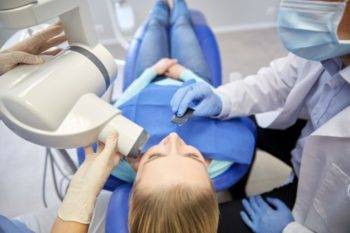Oral Surgery in Buffalo, NY
Experienced Buffalo Dentists Providing Oral Surgery and Maxillofacial Surgery in WNY
When consistent oral hygienic practices cannot spare a tooth from bacterial infection or sudden injury, oral surgery may be necessary in order to shield the rest of the mouth from further complications.
When a crack or a cavity in a tooth is left untreated, the infection can spread throughout the interior of the tooth, and after a certain point, a dentist is limited in her or his ability to repair the tooth. A combination of a dental filling and a crown can replace much of a tooth’s degraded tissue, but when so little of the tooth remains that not even endodontic treatment such as a root canal can help, the tooth may have to be extracted. Otherwise, the bacteria can permeate the jawbone, dental nerves, and bloodstream, potentially traveling to and infecting other areas of the body.
Download Our Free Dental Treatment Guide
 Other factors that may necessitate the extraction of a tooth include gum disease and dental maldevelopment. Due to a genetic predisposition or a simple lack of consistent dental care, the gingiva (gums) can become infected, resulting in gingivitis, an inflammatory disease. Gingivitis, when not treated or carefully managed, can progress to periodontitis, a condition in which the bony tissue of the oral cavity is slowly broken down, loosening the roots of the teeth. A similar condition to affect the gums is the eruption (growing in) of wisdom teeth, which begin to appear in most adults when they reach the age of 21 years. Wisdom teeth once served an evolutionary advantage, but as the human jaw has shrunk, there is insufficient space for wisdom teeth to erupt, forcing them to frequently push against the other molars even before they have breached the surface of the gums.
Other factors that may necessitate the extraction of a tooth include gum disease and dental maldevelopment. Due to a genetic predisposition or a simple lack of consistent dental care, the gingiva (gums) can become infected, resulting in gingivitis, an inflammatory disease. Gingivitis, when not treated or carefully managed, can progress to periodontitis, a condition in which the bony tissue of the oral cavity is slowly broken down, loosening the roots of the teeth. A similar condition to affect the gums is the eruption (growing in) of wisdom teeth, which begin to appear in most adults when they reach the age of 21 years. Wisdom teeth once served an evolutionary advantage, but as the human jaw has shrunk, there is insufficient space for wisdom teeth to erupt, forcing them to frequently push against the other molars even before they have breached the surface of the gums.
After a tooth is removed, the bony tissue below begins to decrease in thickness and then recede. To prevent as much bone loss as possible and in order to prepare the area for a future dental implant, a bone graft may be recommended. This procedure is known as ridge augmentation, and it is essential for preserving the integrity of the former tooth’s location for future use and modification. In the rear of the upper jawbone, it is unfortunately not always possible to protect the formerly infected area and prepare it for dental implant installation. If multiple molars and/or premolars have been lost, or if years have passed since one or more of these teeth have fallen out, the jawbone may be especially thin in that area—too thin to adequately and permanently support a dental implant. A sinus lift, also known as a sinus augmentation, is an effective way to increase the amount of osseous (bony) tissue in the maxilla so that dental implantation can be successful.
Surgery is not a process that any patient wants to undergo, as it involves invasive treatment and a prolonged and sometimes uncomfortable recovery. When consistent oral hygienic practices cannot spare a tooth from bacterial infection or sudden injury, however, surgery may be necessary in order to shield the rest of the mouth from further complications. Consult your dentist today about how to effectively protect your teeth and gums, as regular and thorough maintenance of your dental health can help you to avoid oral surgery.
Download Our Free Dental Treatment Guide
The experienced Buffalo oral surgeons at Teach Dental Group have provided affordable oral surgery treatments to the Western New York region for over 40 years. Our services include dental implant surgery, wisdom teeth removal, tooth extractions, and more.
Follow us on Facebook!